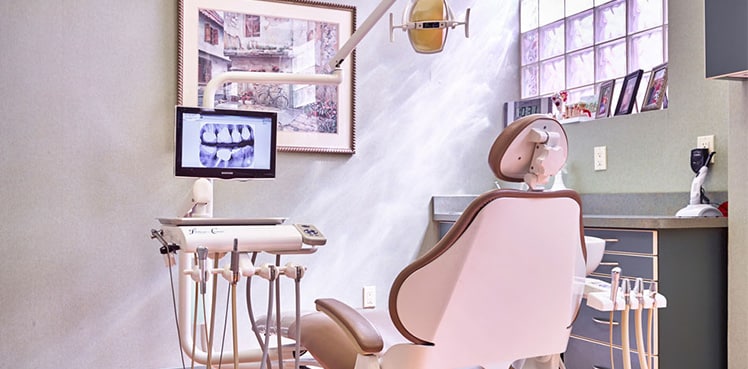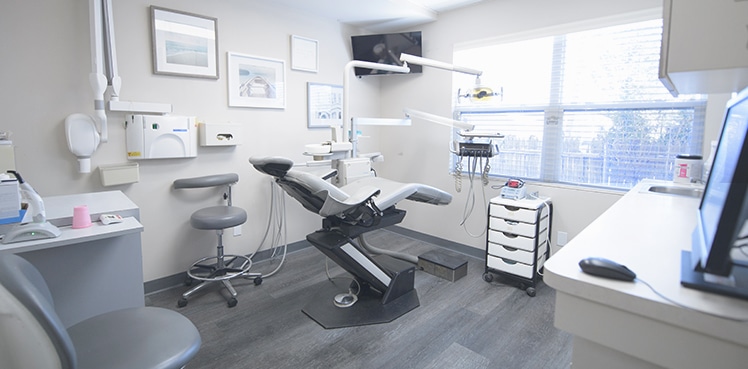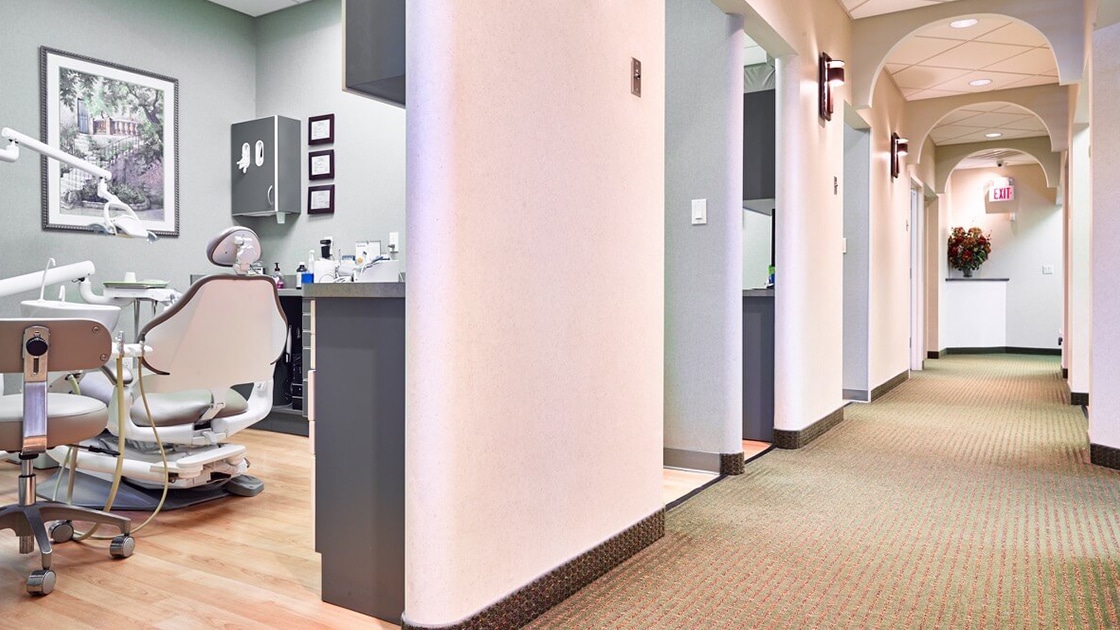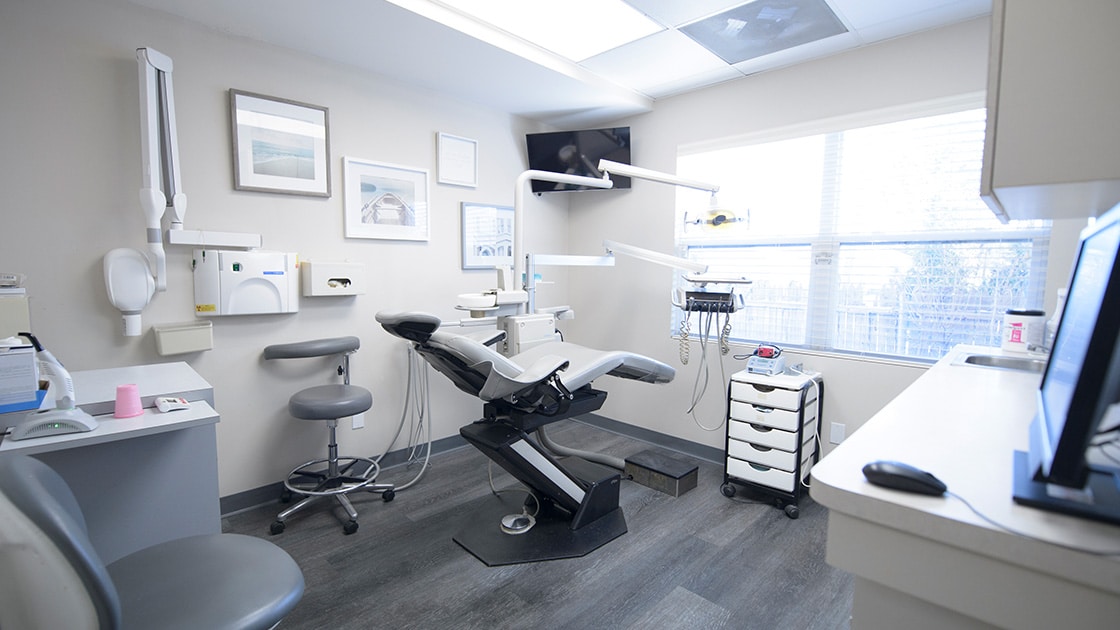The Ricco Dental Group:
Providing Premium Dental Care
for All Ages in Plainview & Massapequa
At The Ricco Dental Group, we do things differently. We take a non-judgmental, compassionate approach to comprehensive dental care. Our dentists and team of dental professionals in Plainview and Massapequa will make you feel welcomed and comfortable throughout the entirety of your visit.
The Ricco Dental Group is a privately owned, all-age dental practice providing comprehensive dental care at our two state-of-the-art dental offices in Plainview and Massapequa, NY. Boasting decades of experience in all aspects of dentistry, at The Ricco Dental Group, Dr. Steven Ricco and Dr. Jay Lubliner provide oral healthcare services for your whole family.
To learn more or to schedule an appointment call our Plainview office at 516-931-3999 or our Massapequa office at 516-798-0223 or send us a message.
Meet Dr. Ricco and Dr. Lubliner

Steven Ricco, DDS
A former college football player at The University of Delaware, Dr. Ricco earned his Doctor of Dental Surgery (DDS) from the SUNY Stony Brook School of Dental Medicine. He then earned admittance to the prestigious North Shore University Hospital for his residency. Dr. Ricco is a Plainview native, who has on multiple occasions volunteered his time and talents providing dental care to patients in developing nations.

Jay B. Lubliner, DMD
Dr. Jay Lubliner attended the University of Pennsylvania SUNY where he earned his Doctor of Medicine in Dentistry (DMD). He completed his residency at Stony Brook School of Dental Medicine with a focus on surgical and prosthetic treatment. In 2024, Dr. Lubliner is celebrating 30 years in private dental practice. He is also a talented, award-winning artist who spends much of his free time drawing, painting, and sculpting.
The Ricco Dental Group
Massapequa
More About The Ricco Dental Group
The Ricco Dental Group aims to make your oral healthcare as accessible and convenient as possible. With locations in Massapequa and Plainview, we are an easy drive from anywhere in Nassau or Suffolk County. It is our honor and privilege to treat patients from Hicksville, Muttontown, Bethpage, Old Bethpage, Jericho, Syosset, Levittown, Seaford, Wantagh, Amityville, Bellmore, Farmingdale, and surrounding areas.
Our two locations ensure that you can get the dental care you need when you need it. At our Massapequa and Plainview, NY dental practices, patients receive skillful dental care from Dr. Steven Ricco, and Dr. Jay Lubliner.
The Ricco Dental Group continues to buck the trend of corporate-owned dental practices. As a privately owned practice, patients receive the highly personalized, friendly, familiar, and professional service that you deserve from a hometown dental practice.
At The Ricco Dental Group’s two Nassau County locations, Dr. Ricco and Dr. Lubliner embrace the power of technology in enhancing patient comfort, expediting patient care, and ensuring successful outcomes from dental treatment.
Our modern dental practices in Massapequa and Plainview, NY are equipped with technologically advanced devices, equipment, dental tools, and software, to make your dental care safe, successful, and pleasant. Some of the many technologies that we employ include:
- 3D Digital Intraoral Scans
- Digital X-rays
- Panoramic X-rays
- Digital Intraoral Cameras
- Soft Tissue Lasers
- Electronic Apex Locator
- CamX Spectra Caries Detection Device
- Ultra-Quiet Handpieces
- Vizilite Oral Cancer Detection
- Prophy Jet Polishers
- Flat Screen Monitors Adjacent to Patient Chairs
General Dentistry - With general dentistry services, we offer many different procedures that will allow you to maintain your oral health. This includes routine care, such as dental cleanings and examinations. Seeing your dentist regularly is the best way to address and diagnose any dental concerns.
Family Dentistry - Dental experiences at a young age can set the foundation for a lifetime of oral health. We offer a comprehensive list of dental services that can be utilized by everyone in your family. For many busy families, this proves to be very convenient.
Conscious Oral Sedation - Patients who have a high level of anxiety or who are nervous can find relief with conscious oral sedation. This allows them to remain calm and relaxed during their dental procedure though they will still be awake and able to maintain verbal contact.
Dental Crowns - A dental crown is a means of restoring the tooth both in appearance and functionality. The crown looks just like a real tooth and is designed to cover a tooth that is lacking in structural integrity.
Dental Bridges - Dental bridges are designed using a dental crown, but rather than covering one tooth, they are designed to replace multiple missing teeth.
Porcelain Veneers - A cosmetic dentistry procedure, porcelain veneers are bonded to teeth, leaving patients with a beautiful smile. They are a fantastic solution for covering imperfections, such as gaps, discoloration, chipped teeth, and more.
Cosmetic Dentistry - Most people are not born with a perfect smile. But, thanks to cosmetic dental procedures, it is possible to make it happen. Teeth whitening, porcelain veneers, cosmetic bonding, dental crowns, and dental implants are just a few of our cosmetic dentistry services.
Dental Implants - Dental implants are the most natural-appearing tooth alternative available. They both function and appear like a real teeth.
Restorative Dentistry - There are many procedures available to restore teeth that have been broken, impacted by decay, or missing. Thanks to procedures like fillings, crowns, inlays and onlays, dental bridges, dentures, dental implants, and more - smiles can be restored.
Root Canals - When decay has made its way into the pulp of the tooth, a root canal can provide much-needed relief from pain by cleaning and treating the infection - and then resealing the tooth. Root canals are very common, routine procedures.
Emergency Dentistry - A tooth that has been broken or knocked out, swelling, toothache, and more are all examples of dental emergencies that need the attention of a skilled dentist. At The Ricco Dental Group, we don’t want you left dealing with your dental emergency alone. We offer emergency services to give you the best chance of saving your natural tooth while giving you the relief you need.
Dentures - Seeking dentures can be beneficial for those who are missing quite a few teeth. They will help restore both the appearance of the smile as well as overall - and they restore oral functions, too. Full dentures, partial dentures, and dental implant-supported dentures and partials are all offered by The Ricco Dental Group.
While enjoying your dental visit is important, so is ensuring you that you are receiving the highest-quality dental care. Our dentists Dr. Ricco and Dr. Lubliner use state-of-the-art technology to provide patients with the highest level of care imaginable.
Call us at the Plainview location 516-931-3999 or the Massapequa location 516-798-0223 to schedule an appointment.
The Ricco Dental Group:
Providing Premium Dental Care
for All Ages in Plainview & Massapequa
At The Ricco Dental Group, we do things differently. We take a non-judgmental, compassionate approach to comprehensive dental care. Our dentists and team of dental professionals in Plainview and Massapequa will make you feel welcomed and comfortable throughout the entirety of your visit.
The Ricco Dental Group is a privately owned, all-age dental practice providing comprehensive dental care at our two state-of-the-art dental offices in Plainview and Massapequa, NY. Boasting decades of experience in all aspects of dentistry, at The Ricco Dental Group, Dr. Steven Ricco and Dr. Jay Lubliner provide oral healthcare services for your whole family.
To learn more or to schedule an appointment, contact us or call 516-931-3999 for our Plainview, NY office or 516-798-0223 for our Massapequa, NY office.
Meet Dr. Ricco and Dr. Lubliner

Steven Ricco, DDS
A former college football player at The University of Delaware, Dr. Ricco earned his Doctor of Dental Surgery (DDS) from the SUNY Stony Brook School of Dental Medicine. He then earned admittance to the prestigious North Shore University Hospital for his residency. Dr. Ricco is a Plainview native, who has on multiple occasions volunteered his time and talents providing dental care to patients in developing nations.

Jay B. Lubliner, DMD
Dr. Jay Lubliner attended the University of Pennsylvania SUNY where he earned his Doctor of Medicine in Dentistry (DMD). He completed his residency at Stony Brook School of Dental Medicine with a focus on surgical and prosthetic treatment. In 2024, Dr. Lubliner is celebrating 30 years in private dental practice. He is also a talented, award-winning artist who spends much of his free time drawing, painting, and sculpting.
Dental Services at the Ricco Dental Group
At The Ricco Dental Group, Dr. Ricco and Dr. Lubliner provide comprehensive dental care ranging from preventive care to cosmetic dentistry, periodontal treatment, dental implants, emergency treatment, orthodontic treatment (Invisalign) and everything in between.

Family Dentistry
We offer a comprehensive list of dental services that can be utilized by everyone in your family.

Cosmetic Dentistry
Cosmetic Dentistry can help improve the aesthetics and function of your smile!

Sedation Dentistry
This allows you to remain calm and relaxed during your dental procedure.
Patient Information
We provide a comfortable atmosphere that makes visiting the dentist feel more like spending time with friends or family. We want to be the practice that patients actually want to visit!
Read what our patients are saying...
Contact Us
Looking for a dentist in Plainview, NY? Use the information below to contact our office.
The Ricco Dental Group
The Ricco Dental Group aims to make your oral healthcare as accessible and convenient as possible. With locations in Massapequa and Plainview, we are an easy drive from anywhere in Nassau or Suffolk County. It is our honor and privilege to treat patients from Hicksville, Muttontown, Bethpage, Old Bethpage, Jericho, Syosset, Levittown, Seaford, Wantagh, Amityville, Bellmore, Farmingdale, and surrounding areas.
Our two locations ensure that you can get the dental care you need when you need it. At our Massapequa and Plainview, NY dental practices, patients receive skillful dental care from Dr. Steven Ricco, and Dr. Jay Lubliner.
The Ricco Dental Group continues to buck the trend of corporate-owned dental practices. As a privately owned practice, patients receive the highly personalized, friendly, familiar, and professional service that you deserve from a hometown dental practice.
At The Ricco Dental Group’s two Nassau County locations, Dr. Ricco and Dr. Lubliner embrace the power of technology in enhancing patient comfort, expediting patient care, and ensuring successful outcomes from dental treatment.
Our modern dental practices in Massapequa and Plainview, NY are equipped with technologically advanced devices, equipment, dental tools, and software, to make your dental care safe, successful, and pleasant. Some of the many technologies that we employ include:
- 3D Digital Intraoral Scans
- Digital X-rays
- Panoramic X-rays
- Digital Intraoral Cameras
- Soft Tissue Lasers
- Electronic Apex Locator
- CamX Spectra Caries Detection Device
- Ultra-Quiet Handpieces
- Vizilite Oral Cancer Detection
- Prophy Jet Polishers
- Flat Screen Monitors Adjacent to Patient Chairs
General Dentistry - With general dentistry services, we offer many different procedures that will allow you to maintain your oral health. This includes routine care, such as dental cleanings and examinations. Seeing your dentist regularly is the best way to address and diagnose any dental concerns.
Family Dentistry - Dental experiences at a young age can set the foundation for a lifetime of oral health. We offer a comprehensive list of dental services that can be utilized by everyone in your family. For many busy families, this proves to be very convenient.
Conscious Oral Sedation - Patients who have a high level of anxiety or who are nervous can find relief with conscious oral sedation. This allows them to remain calm and relaxed during their dental procedure though they will still be awake and able to maintain verbal contact.
Dental Crowns - A dental crown is a means of restoring the tooth both in appearance and functionality. The crown looks just like a real tooth and is designed to cover a tooth that is lacking in structural integrity.
Dental Bridges - Dental bridges are designed using a dental crown, but rather than covering one tooth, they are designed to replace multiple missing teeth.
Porcelain Veneers - A cosmetic dentistry procedure, porcelain veneers are bonded to teeth, leaving patients with a beautiful smile. They are a fantastic solution for covering imperfections, such as gaps, discoloration, chipped teeth, and more.
Cosmetic Dentistry - Most people are not born with a perfect smile. But, thanks to cosmetic dental procedures, it is possible to make it happen. Teeth whitening, porcelain veneers, cosmetic bonding, dental crowns, and dental implants are just a few of our cosmetic dentistry services.
Dental Implants - Dental implants are the most natural-appearing tooth alternative available. They both function and appear like a real teeth.
Restorative Dentistry - There are many procedures available to restore teeth that have been broken, impacted by decay, or missing. Thanks to procedures like fillings, crowns, inlays and onlays, dental bridges, dentures, dental implants, and more - smiles can be restored.
Root Canals - When decay has made its way into the pulp of the tooth, a root canal can provide much-needed relief from pain by cleaning and treating the infection - and then resealing the tooth. Root canals are very common, routine procedures.
Emergency Dentistry - A tooth that has been broken or knocked out, swelling, toothache, and more are all examples of dental emergencies that need the attention of a skilled dentist. At The Ricco Dental Group, we don’t want you left dealing with your dental emergency alone. We offer emergency services to give you the best chance of saving your natural tooth while giving you the relief you need.
Dentures - Seeking dentures can be beneficial for those who are missing quite a few teeth. They will help restore both the appearance of the smile as well as overall - and they restore oral functions, too. Full dentures, partial dentures, and dental implant-supported dentures and partials are all offered by The Ricco Dental Group.
While enjoying your dental visit is important, so is ensuring you that you are receiving the highest-quality dental care. Our dentists Dr. Ricco and Dr. Lubliner use state-of-the-art technology to provide patients with the highest level of care imaginable.
Call us at the Plainview location 516-931-3999 or the Massapequa location 516-798-0223 to schedule an appointment.






















